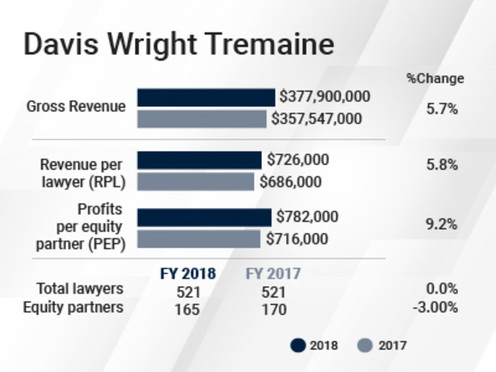Davis Wright Tremaine Sees Gains in Revenue and Profit
The firm saw a slight decline in the number of equity partners, while its total head count remained flat.
March 27, 2019 at 04:38 PM
3 minute read
 Davis Wright Tremaine posted increases in revenue and profits in 2018.
Davis Wright Tremaine posted increases in revenue and profits in 2018.
Davis Wright Tremaine posted notable gains in profits and revenue in 2018.
Gross revenue grew 5.7 percent, from $357.5 million to $377.9 million, as net income rose 5.9 percent, from $121.7 million to $128.8 million. Profits per equity partner saw a sizable increase of 9.2 percent, from $716,000 to $782,000.
The number of equity partners dropped to 165 from 170, and total head count remained flat at 521 attorneys.
Sarah English Tune, chair of the firm's corporate and business transactions practice, said much of the growth is due to the firm's strategy of empowering its younger attorneys.
“We put our young partners in leadership positions,” Tune said. “We've really given our younger attorneys, especially younger partners, the opportunity and support to develop their practice.”
 As an example, Tune pointed out the firm's food and beverage practice, created “essentially from scratch” by Davis Wright partner Jesse Lyon. The practice area was critical to assisting on a $120 million acquisition of vegan meat and cheese company Field Roast Grain Meat Co. by Maple Leaf Foods in January of last year. Don Buder, also part of the practice group, was instrumental in helping with the organizing and opening of Naturally Bay Area, a food and beverage industry group.
As an example, Tune pointed out the firm's food and beverage practice, created “essentially from scratch” by Davis Wright partner Jesse Lyon. The practice area was critical to assisting on a $120 million acquisition of vegan meat and cheese company Field Roast Grain Meat Co. by Maple Leaf Foods in January of last year. Don Buder, also part of the practice group, was instrumental in helping with the organizing and opening of Naturally Bay Area, a food and beverage industry group.
Davis Wright's large media practice also had a great year, according to firm leaders. Chief strategy officer Mark Usellis said the attention on the media has generated significant business as the firm represented a slate of major news outlets during litigation in 2018, including BuzzFeed, The New York Times, CNN and the Washington Post. (Amazon is also a major client of the firm.)
Looking toward 2019, the firm revamped its five-year strategic plan. Tune said the new blueprint is similar to the previous one, as the firm looks to continue the success it had over the last five years. Since 2014, Davis Wright has consistently outperformed peer firms in revenue growth and profits per equity partner, according to ALM Intelligence. The firm's gross revenue grew 32.6 percent, from $285 million to $378 million, over that period. Profits per partner rose from $540,000 to $782,000—a 44.8 percent increase.
“I feel like we got a pretty good approach going, and it's really a matter of being disciplined and focused,” Usellis said. “We want to be entrepreneurial. We don't want to be stagnant.”
Similar Stories:
This content has been archived. It is available through our partners, LexisNexis® and Bloomberg Law.
To view this content, please continue to their sites.
Not a Lexis Subscriber?
Subscribe Now
Not a Bloomberg Law Subscriber?
Subscribe Now
NOT FOR REPRINT
© 2025 ALM Global, LLC, All Rights Reserved. Request academic re-use from www.copyright.com. All other uses, submit a request to [email protected]. For more information visit Asset & Logo Licensing.
You Might Like
View All
Government Attorneys Face Reassignment, Rescinded Job Offers in First Days of Trump Administration
4 minute read


Energy Lawyers Field Client Questions as Trump Issues Executive Orders on Industry Funding, Oversight
6 minute readTrending Stories
- 1Treasury GC Returns to Davis Polk to Co-Chair White-Collar Defense and Investigations Practice
- 2Decision of the Day: JFK to Paris Stowaway's Bail Revocation Explained
- 3Doug Emhoff, Husband of Former VP Harris, Lands at Willkie
- 4LexisNexis Announces Public Availability of Personalized AI Assistant Protégé
- 5Some Thoughts on What It Takes to Connect With Millennial Jurors
Who Got The Work
J. Brugh Lower of Gibbons has entered an appearance for industrial equipment supplier Devco Corporation in a pending trademark infringement lawsuit. The suit, accusing the defendant of selling knock-off Graco products, was filed Dec. 18 in New Jersey District Court by Rivkin Radler on behalf of Graco Inc. and Graco Minnesota. The case, assigned to U.S. District Judge Zahid N. Quraishi, is 3:24-cv-11294, Graco Inc. et al v. Devco Corporation.
Who Got The Work
Rebecca Maller-Stein and Kent A. Yalowitz of Arnold & Porter Kaye Scholer have entered their appearances for Hanaco Venture Capital and its executives, Lior Prosor and David Frankel, in a pending securities lawsuit. The action, filed on Dec. 24 in New York Southern District Court by Zell, Aron & Co. on behalf of Goldeneye Advisors, accuses the defendants of negligently and fraudulently managing the plaintiff's $1 million investment. The case, assigned to U.S. District Judge Vernon S. Broderick, is 1:24-cv-09918, Goldeneye Advisors, LLC v. Hanaco Venture Capital, Ltd. et al.
Who Got The Work
Attorneys from A&O Shearman has stepped in as defense counsel for Toronto-Dominion Bank and other defendants in a pending securities class action. The suit, filed Dec. 11 in New York Southern District Court by Bleichmar Fonti & Auld, accuses the defendants of concealing the bank's 'pervasive' deficiencies in regards to its compliance with the Bank Secrecy Act and the quality of its anti-money laundering controls. The case, assigned to U.S. District Judge Arun Subramanian, is 1:24-cv-09445, Gonzalez v. The Toronto-Dominion Bank et al.
Who Got The Work
Crown Castle International, a Pennsylvania company providing shared communications infrastructure, has turned to Luke D. Wolf of Gordon Rees Scully Mansukhani to fend off a pending breach-of-contract lawsuit. The court action, filed Nov. 25 in Michigan Eastern District Court by Hooper Hathaway PC on behalf of The Town Residences LLC, accuses Crown Castle of failing to transfer approximately $30,000 in utility payments from T-Mobile in breach of a roof-top lease and assignment agreement. The case, assigned to U.S. District Judge Susan K. Declercq, is 2:24-cv-13131, The Town Residences LLC v. T-Mobile US, Inc. et al.
Who Got The Work
Wilfred P. Coronato and Daniel M. Schwartz of McCarter & English have stepped in as defense counsel to Electrolux Home Products Inc. in a pending product liability lawsuit. The court action, filed Nov. 26 in New York Eastern District Court by Poulos Lopiccolo PC and Nagel Rice LLP on behalf of David Stern, alleges that the defendant's refrigerators’ drawers and shelving repeatedly break and fall apart within months after purchase. The case, assigned to U.S. District Judge Joan M. Azrack, is 2:24-cv-08204, Stern v. Electrolux Home Products, Inc.
Featured Firms
Law Offices of Gary Martin Hays & Associates, P.C.
(470) 294-1674
Law Offices of Mark E. Salomone
(857) 444-6468
Smith & Hassler
(713) 739-1250










